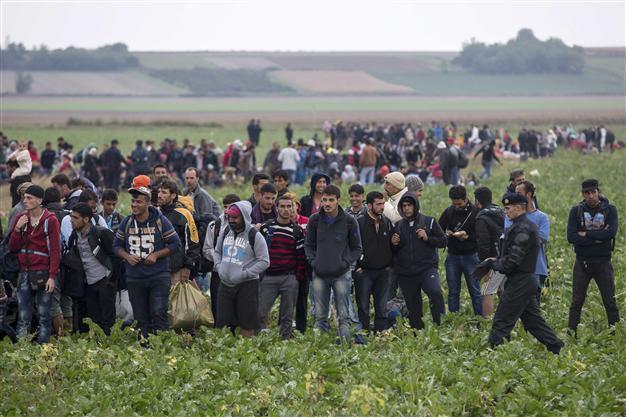Croatia, Serbia trade barbs as Hungary builds new migrant barrier
BUDAPEST – Agence France-Presse

Migrants stand in a field as they wait to board buses, after crossing the border from Serbia, near Tovarnik, Croatia September 24, 2015. Reuters Photo
Croatia and Serbia traded ugly barbs Sept. 24 and slammed tit-for-tat border restrictions on each other as Hungary started building yet another razor-wire barrier to keep refugees out, this time from neighbouring Slovenia.
The face-off between Zagreb and Belgrade, the worst since they fought a war in the 1990s, came as thousands of migrants continued to stream through the Balkans towards northern Europe in the European Union’s worst ever migration crisis.
The unprecedented flow has put the old enemies at each other’s throats after Croatia closed all but one of its border crossings to slow the tide, and accused Serbia of doing a deal with Hungary to send migrants its way.
Budapest sealed its border with Serbia last week, closing the main crossing and laying down razor wire along the entire frontier, prompting thousands of migrants to enter the EU through Croatia instead.
Hungarian police said a record 10,046 migrants arrived Wednesday from Croatia, and Budapest announced it would decide “soon” whether to also shut that border.
It has already laid a razor-wire barrier along 40 kilometers of the frontier with Croatia not marked by the Drava river, and on Thursday Slovenia’s foreign ministry said Hungary had also begun building a barrier on its border - the first within the European Union’s passport-free Schengen zone.
The news was likely to bring further difficulties for migrants, many of them Syrians, who under normal circumstances would be celebrating the major Muslim feast of Eid al-Adha.
“Eid al-Adha was the most happy and powerful moment for my family,” said Cecilia, a student from Damascus, her face in her hands as she sat in a remote field in Croatia.
“It’s no longer the case.”
U.N. Secretary-General Ban Ki-moon on Thursday welcomed the EU’s decision to inject $1 billion to help countries overwhelmed by Syrian refugees, but said “efforts are still required to resolve the crises and conflicts that cause people to flee, including in Syria.”
